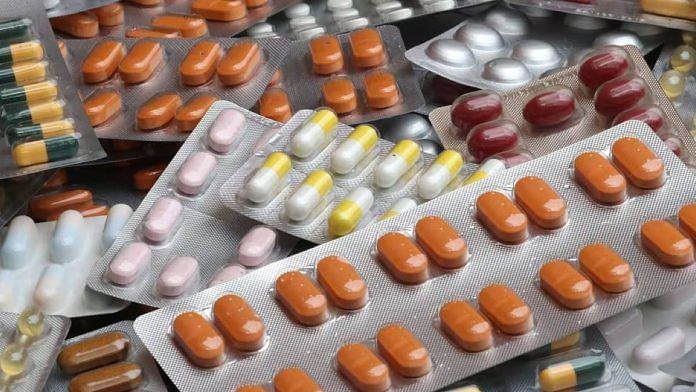New Delhi: Following a crackdown on 156 fixed dose combination (FDC) drugs after finding them without therapeutic justification and even unsafe in several cases, a top official in the Central Drugs Standard Control Organisation (CDSCO) said Friday that a ban may follow soon on 34 more such formulations. FDCs contain a combination of two or more active pharmaceutical ingredients (APIs) in a single form, which are usually manufactured and distributed in a fixed ratio. In a notification issued earlier this month, the government banned 156 FDCs, used in treating common conditions such as fever, allergies, hypertension, colds, skin disorders, and pain across several therapeutic categories.
“A large number of FDCs had been approved by state licensing authorities, without permission from CDSCO, which were thoroughly reviewed by experts. Based on their recommendations, action is being taken,” a senior CDSCO official said. While 344 such FDCs were banned in 2018, another 156 have been banned this month.

“But a third lot comprising 34 FDCs which are mostly vitamin combinations are still being evaluated and a decision on them will follow soon,” the official quoted above said. Consequent to the 59th report of the Parliamentary Standing Committee on the functioning of CDSCO in 2012, the Union government had constituted the Chandrakant Kokate committee to examine FDCs which were licensed by states without prior approval of the Drug Controller General of India (DCGI). According to the first assessment report of this committee, a number of FDCs were declared as ‘irrational’ and the same were prohibited by the Centre.
However, these notifications were challenged in court and the matter was referred to the Drug Technical Advisory Board (DTAB), a technical panel under the CDSCO. The DTAB constituted a sub-committee under the Chairmanship of Dr Nilima Kshirsagar, who was then the chief clinical pharmacologist with the Indian Council of Medical Research to examine these prohibited FDCs. Based on the recommendations of the DTAB sub-committee, the central government prohibited 344 FDCs in 2018.
Subsequently, the Kokate committee submitted its second assessment report to the Union health ministry on the remaining FDCs which could not be assessed in the first lot. “Based on the recommendations of the Kokate Committee, 156 FDCs which were declared as irrational were also referred to the Kshirsagar panel and now these are also being banned,” an official said. He added that following a decision on the 34 FDCs which are currently under review, the problem of unapproved and irrational FDCs will largely be addressed.
(Edited by Tikli Basu) Also read: Widely used drug cocktails for fever, cold on Centre’s latest ban list, calls grow for penalising makers var ytflag = 0;var myListener = function() {document.removeEventListener('mousemove', myListener, false);lazyloadmyframes();};document.addEventListener('mousemove', myListener, false);window.
addEventListener('scroll', function() {if (ytflag == 0) {lazyloadmyframes();ytflag = 1;}});function lazyloadmyframes() {var ytv = document.getElementsByClassName("klazyiframe");for (var i = 0; i < ytv.length; i++) {ytv[i].
src = ytv[i].getAttribute('data-src');}} Save my name, email, and website in this browser for the next time I comment. Δ document.
getElementById( "ak_js_1" ).setAttribute( "value", ( new Date() ).getTime() );.


















